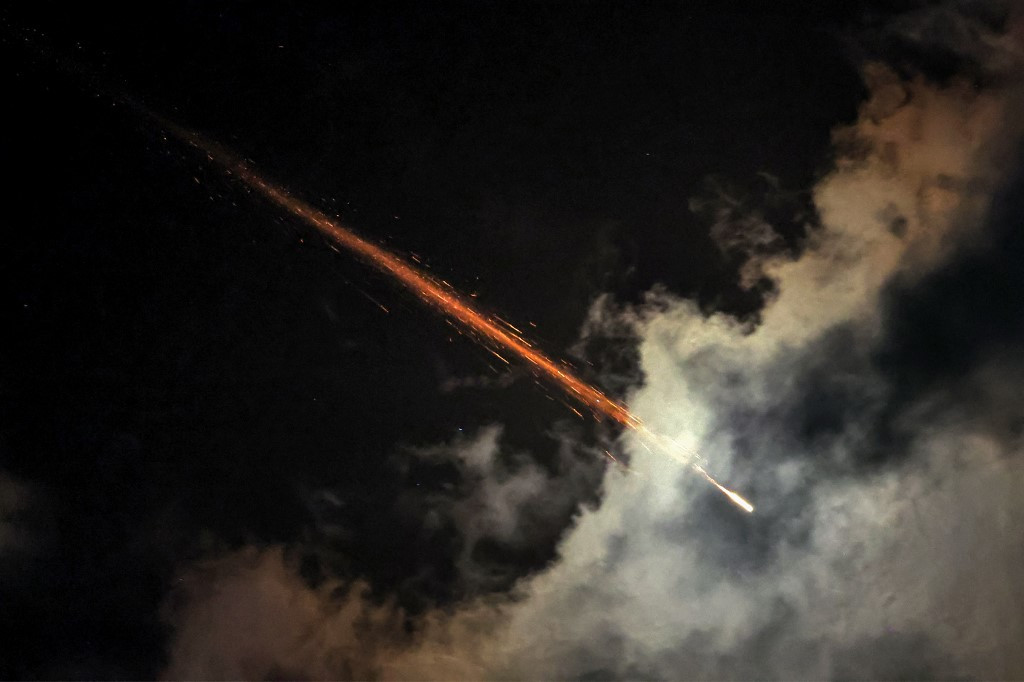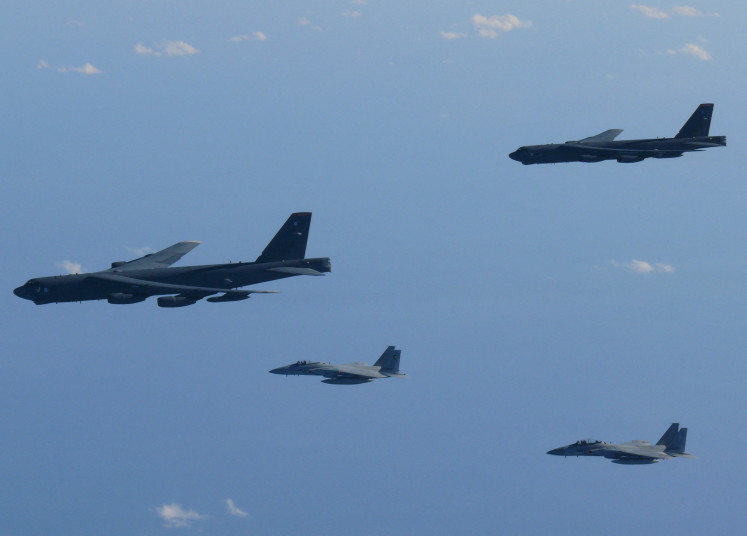Popular Reads
Top Results
Can't find what you're looking for?
View all search resultsPopular Reads
Top Results
Can't find what you're looking for?
View all search resultsIran says attack on Israel is over
Washington said it would work with longtime ally Israel to make sure Iran faced "severe consequences" for Tuesday's attack, which Israel said involved more than 180 ballistic missiles.
Change text size
Gift Premium Articles
to Anyone
 This picture shows projectiles being intercepted by Israel near the northern city of Baqa al-Gharbiya on October 1, 2024. Air raid sirens sounded in central Israel on October 1, the military said, a day after the army launched ground operations into southern Lebanon targeting Hezbollah positions. (AFP/Ahmad Gharabli)
This picture shows projectiles being intercepted by Israel near the northern city of Baqa al-Gharbiya on October 1, 2024. Air raid sirens sounded in central Israel on October 1, the military said, a day after the army launched ground operations into southern Lebanon targeting Hezbollah positions. (AFP/Ahmad Gharabli)
I
ran said early on Wednesday that its missile attack on Israel was over barring further provocation, while Israel and the US promised to retaliate against Tehran as fears of a wider war intensified.
Washington said it would work with longtime ally Israel to make sure Iran faced "severe consequences" for Tuesday's attack, which Israel said involved more than 180 ballistic missiles.
The United Nations Security Council scheduled a meeting about the Middle East for Wednesday, and the European Union called for an immediate ceasefire.
"Our action is concluded unless the Israeli regime decides to invite further retaliation. In that scenario, our response will be stronger and more powerful," Iranian Foreign Minister Abbas Araqchi said in a post on X early on Wednesday.
Israel renewed its bombardment early on Wednesday of Beirut's southern suburbs, a stronghold of the Iran-backed armed Hezbollah group, with at least a dozen airstrikes against what it said were targets belonging the group.
Large plumes of smoke were seen rising from parts of the suburbs. Israel issued new evacuation orders for the area, which have largely emptied after days of heavy strikes.
Iran fired 200 missiles at Israel including hypersonic weapons for the first time, state TV reported Wednesday, a barrage that Israel vowed to make Tehran "pay" for.
Iranian media carried online footage of what they said were missiles being fired, which the Islamic Revolutionary Guard Corps said were targeting "three military bases" around Tel Aviv and other bases.
The Revolutionary Guards said "90 percent" of the missiles "hit their targets" late Tuesday.
The Israeli military said Iran launched around 180 missiles at its territory, most of which were intercepted.
Iran in June 2023 unveiled an intermediate-range ballistic missile, capable of travelling at hypersonic speeds of up to 15 times the speed of sound.
Then-president Ebrahim Raisi said the weapon would boost Iran's "power of deterrence" and "bring peace and stability to the countries of the region".
Unlike conventional ballistic missiles, hypersonic ones fly on a trajectory low in the atmosphere, enabling them to reach their targets more quickly and with less chance of being intercepted by modern air defences.
Israeli Prime Minister Benjamin Netanyahu said Iran made a "big mistake" with its missile fire, which follows Israel killing Hezbollah leader Hassan Nasrallah last week.
After the United States said it was discussing a joint response with Israel, Iran's chief of staff warned that Tehran would hit Israeli infrastructure if its territory is attacked.









